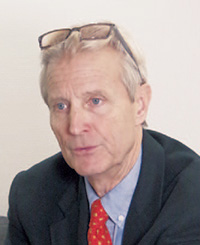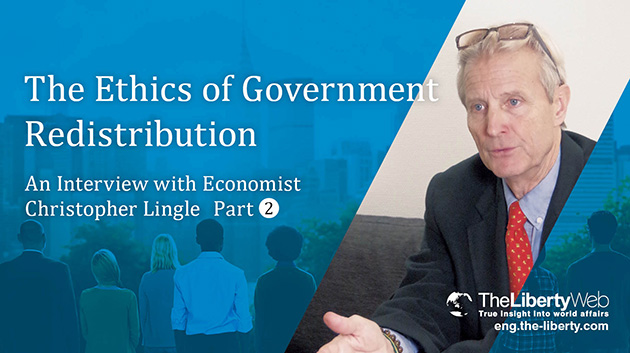The Ethics of Government Redistribution
An Interview with Economist Christopher Lingle (Part 2)
Economist

Dr. Christopher Lingle
Born in Georgia, U.S.A. in 1948. Lingle earned a doctorate in economics from the University of Georgia in 1977. He is a fellow at the Centre for Civil Society, a think tank based in New Delhi. He guides liberal activists at Atlas Network. He is the author of Understanding China’s Socialist Market Economy among several other works.
Key points in this article:
- Government redistribution is unethical in that it is an act of taking from other people.
- Injustice does not come from the market; it appears when the government expands its power against human freedom.
- Historically, social security was the job of religious communities.
An increasing number of younger-generation Americans have a positive opinion on socialism. In November 2019, Gallup, Inc. published a study revealing that 52% of the millennial generation (aged between 18 and 35) have a positive opinion on socialism, and only 45% were against it.
Post-Trump America will slowly decline if people of the next generation who sympathize with socialism become a majority.
If an attempt to close the wealth disparity develops into hatred toward the wealthy members of society, it will make a significant impact on countries like Japan that are already showing socialist tendencies in their economic policy.
But why are the young people of America so supportive of socialism? We interviewed Christopher Lingle, an American economist working to spread economic freedom around the world. (Interviewer: Hanako Cho)
If You Feel Sorry For Others, Act Voluntarily
—Why are there more and more young Americans sympathizing with socialism?
Lingle: IT provides a way for people to enhance their well-being without the kind of investments we needed for the sort of industrial production, like building a factory. Now it’s human capital; it’s brain power. If you’re a young teenager inventing a new application, it’s virtually costless in a sense because you’re just using your creative talents to do things. One of the unfortunate results of that is intangible capital has confused people about the nature of the acquisition of wealth.
One of the things we need to communicate more to young people is, if you really feel sorry for other people, and you really think that someone needs to be helped, then it should be done voluntarily because that’s the only way there’s any moral content.
It is immoral for me to ask the state to take away from a wealthy person to give to the poor, because it means that the wealthy person becomes a slave to the poor person. And there’s no moral outcome in those kinds of arrangements. So, in my view, state involvement in the creation and redistribution of wealth involves immoral acts.
Why The Fight for $15 Is Growing
—The Fight for $15 is a big movement in the U.S.; it is very big.
Lingle: Yes, I think it’s a misunderstanding of the nature of wealth creation. There’s a belief that capitalism in the market economy leads to injustices.
But, it’s not unjust. It’s not unjust that Beyoncé has her talent as an entertainer. Her becoming rich was an act of nature, something she was born with. Being beautiful or handsome, being intelligent, these are not injustices.
If you’re born into a family where there are two parents, you’ll probably have a much higher probability of high earnings and a better education. If you’re born in a family with one parent, you’re more likely to be poor and less educated. That’s not an injustice; it’s just a reality. Now, it may have been a mistake of the single parent, but it’s not an injustice.
Young people believe that capitalism, or the market, creates the injustices. But the market is just a place of human actions and decisions: of people trying to make their lives better.
What is unjust is a government expanding political power against the interests of human freedom. This is what we need to fight against. Instead of expanding political power, we need to find ways to restrict it.
Dependence on Government Will Give Them Too Much Power
—What do you think about sustainable social security?
Lingle: It’s a real problem that the state has become the mechanism by which people depend upon their future. We should depend upon ourselves, our family, and our community, because those are arrangements that are more human. They involve direct interaction with one another.
When the state gets involved, humanity is out of it, because they’re bureaucrats who work from nine to five. You don’t have their phone numbers. But when you’re dealing with your community, they’re there 24/7.
If we look throughout history, except when we had absolute monarchs, human beings looked after each other in a community: for example, a religious community. It worked a lot better.
Every country needs to move its social security and pension system towards a voluntary and market-driven system, because it will be fairer, more just, and more humane. As long as the state’s involved, it’s inhumane, unjust, and inefficient.
If we don’t limit the expansion of political power, we’ll all be worse off. We’re really going backwards until we rediscover the necessity of limited [small] government.
The whole idea of introducing democracy was to secure human liberty. And now it’s about political power, which is what autocracy was about: preserving political power in the hands of the monarch. This system is benefiting the politicians and the people that are demanding privileges from them, but not the rest of us who are paying for it.



















